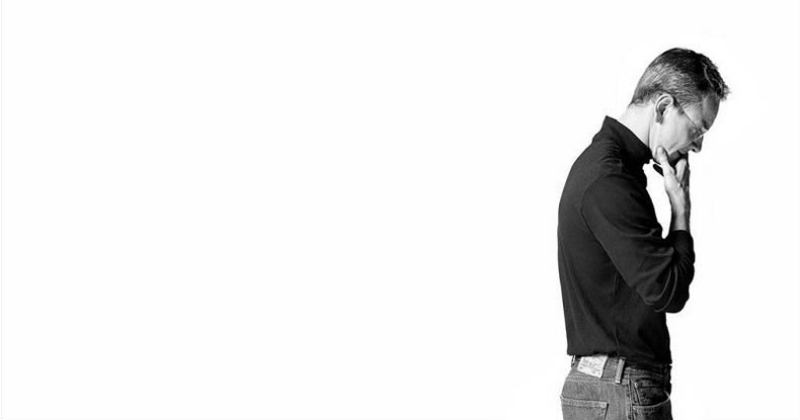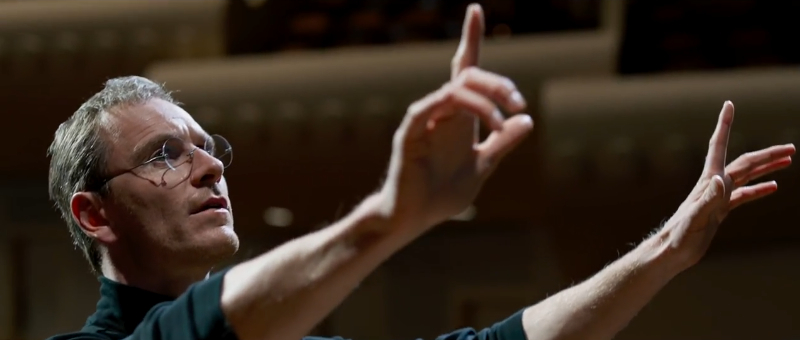
David Fincher seemed an odd, but intriguing, choice to helm an Aaron Sorkin script in 2010. In 2015, Danny Boyle seemed like the studio just grabbed the first high-profile guy they found on the street. The behind-the-scenes turmoil that lead to Steve Jobs finally making it to theaters is well chronicled, but suffice to say, the project, which began at the executive level, went through innumerable variations of director, cast, and eventually studio. What amazes is how ideal the end result feels. Steve Jobs has tremendous clarity of purpose, an out-and-out entertainment machine with a sextet of searing performances that is intelligent about how emotional it is, and firmly cemented in its sense of theatricality. This is drama, first and foremost. It’s also, quite remarkably and fully, a Danny Boyle Picture.
The film is structured around three product launches – the Macintosh computer in 1984, the ill-fated NeXT in 1988, and the iMac in 1998. Three or four short flashbacks are provided, and expository news footage acts as intermissions between the three acts, but for the most part, our entire window into Steve Jobs (Michael Fassbender) and his family and colleagues (Steve doesn’t really do “friends”) is contained to these arenas. But this is not a behind-the-scenes tale. Any discussion of how the events are organized or presented is merely there to get some larger discussion moving. Instead, what Sorkin does is use this framework to illustrate how Jobs was continually haunted by the same struggles throughout his professional life. In each scene, he interacts with the same six people – his marketing director Joanna Hoffman (Kate Winslet), his friend and Apple cofounder Steve “Woz” Wozniak (Seth Rogen), his daughter Lisa (Mackenzie Moss, Ripley Sobo, and Perla Haney-Jardine), his ex-girlfriend and Lisa’s mother (Katherine Waterston), Apple CEO from 1983 to 1993 John Sculley (Jeff Daniels), and Apple’s chief engineer Andy Hertzfeldt (Michael Stuhlbarg). They largely have the same conversations each time. People get older, but they hold onto doubts and inhibitions.
Leave it to Boyle to keep these repetitive encounters invigorating. If there’s one thing you know you’ll get from a Danny Boyle film, it’s plenty of energy. And sure, he goes overboard here and there (look at the rear-projection of a space shuttle Steve is discussing! Insert shots of Steve staring enigmatically at the camera!), but he also lets a few conversations play out in long takes, ramping up the editing only for the more heated exchanges. The third act showdown between Steve and Woz is as exciting, electric, and combative as anything at the cinema this year. Mostly, he funnels this urgency into the performances, which are uniformly excellent, but far from uniform. The actors bring different approaches to the dialogue and physicality, no one seeming like they’re on a different planet, just living different lives. Boyle gives them space to perform as they please physically, which puts the result firmly on the actors’ shoulders. Fassbender seems in complete control of his body, even his emotional eruptions a performed gesture, but what might come off overdetermined in another role is suited to the one he has here. Winslet, similarly, despite a somewhat-uneven accent (Hoffman is Polish), has constant control of herself, a necessary layer of armor in an industry of men (and, just as often, boys). Stuhlbarg and Rogen perform with a sort of shrug, their characters amazed they’ve come this far and completely exhausted by Steve’s demands. Only Daniels gets a little too ostentatious with his body, occasionally going out of his way to pose, though he is otherwise quite good as a father figure who never quite lives up to anything that connotes.

Fassbender skillfully walks the film’s highest wire, appearing in every scene and building a character who evolves without ever quite growing. His Steve Jobs begins the film with the brash confidence of a young man at the top of his field, unconcerned with the impression he gives to anyone, and ends the film…perhaps slightly more concerned, but perhaps more pertinently, with a greater understanding for how to get people on his side. The “cult of personality” surrounding Jobs is almost as important to his success as anything he’s actually done; by the film’s final act, he’s finally learned how to harness that instead of wielding it. In the first act, he talks to his collaborators as their ruler, threatening to call out Andy personally, right there in the auditorium, if the element of the Macintosh he designed doesn’t work perfectly. The third act begins with him magnanimously thanking the assembled team, offering a few encouraging words at the end of his rehearsal. As soon as he returns to private rooms, though, it’s the same old Steve – “It’s not that I want people to hate me,” he says here, “I just don’t care if they do.” The ending, then, the transcendent (and very flashy) climax that Boyle so regularly employs, has a tinge of irony to its earnestness. Steve Jobs toes an incredibly tricky line between dealing with Jobs as a public figure and an individual just like the rest of us, ultimately realizing that his ability to create the former is vital to understanding the latter. When Woz confronts Steve with his limited computing skills, Steve insists that his ability to “play the orchestra” is what made him a success. The ending reminds us that Steve’s orchestra is far bigger than his company.
This process of being haunted by failures and spiritual shortcomings that the protagonist has tried to ignore, but no longer can, is integral to the work Boyle’s been doing over the past near-decade, from Slumdog Millionaire to 127 Hours to Trance. Like Steve Jobs, these films use somewhat unusual premises – a game show, a boulder, a head injury, now a product launch – to trap their protagonists in mental (and often literal) spaces where they are forced to confront elements of themselves that they would rather not. So yes, the real Steve Jobs probably did not even speak with everyone to whom he speaks at all the actual product launches the film depicts, let alone have such in-depth conversations with those he did. But the emotional effect of seeing these people reappear, time and again like ghosts on Christmas Eve, asking the same things of him and getting the same, wildly unsatisfactory answers, transforms these carefully-arranged events into a purgatory. Unlike Boyle’s past purgatories (or even Hells), the density of Sorkin’s dialogue ensures no stone goes unturned, every corner of the protagonist is examined, reexamined, then turned over entirely to the point that the small catharsis he reaches is not total, but still immense. He will never repair every relationship. He can’t even repair himself. But he can put on one hell of a show.



